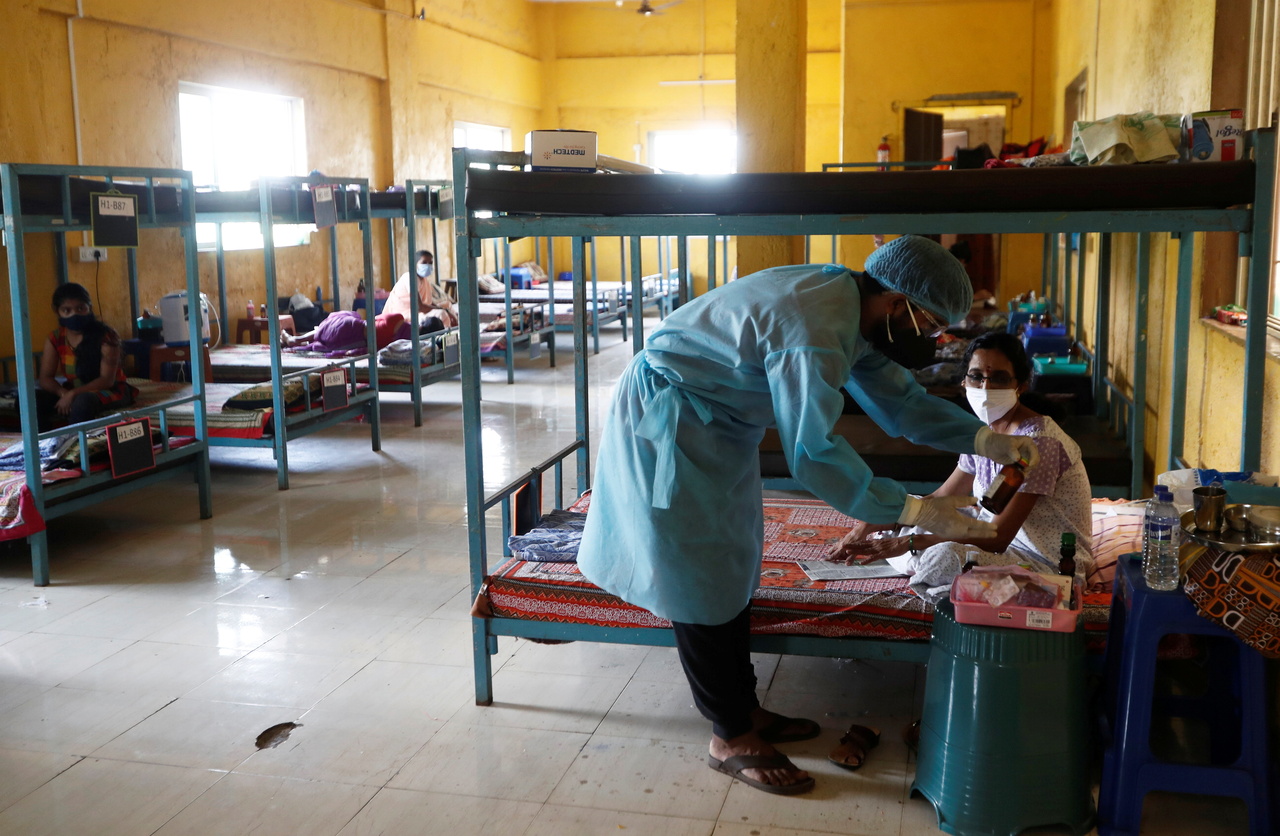Antibiotic overuse on Covid-19 patients in India prompts superbug concerns
Sign up now: Get insights on Asia's fast-moving developments

Patients in India, even those suffering mildly from Covid-19, have been administered strong antibiotics while undergoing treatment.
PHOTO: REUTERS
Follow topic:
NEW DELHI - India is likely to face a growing problem of antibiotic resistance in the next few years, fed by the abuse of powerful drugs in treating suspected bacterial infections in Covid-19 patients.
Patients in India, even those suffering mildly from Covid-19, have been administered strong antibiotics such as azithromycin and doxycycline while undergoing treatment despite clinical trials suggesting that these are not an effective treatment for the disease.
Even messaging from the World Health Organisation and the Indian government urging that these drugs be used only on Covid-19 patients with a bacterial infection has failed to stem their widespread use amid a lack of clarity on Covid-19 treatment protocols.
"They have been used much more liberally than even steroids," said Dr Ambrish Mithal, chairman and head of endocrinology and diabetes at Max Healthcare, a chain of hospitals in India.
"A doctor still thinks a bit before starting steroids but these antibiotics have been thrown in as if they are nothing just because they are relatively safe. If these are so liberally used, I think they will be rendered useless. They probably already are," he added.
Early warning signs of growing microbial resistance were reported in a study by a team of Indian scientists and doctors published on May 24 in the journal Infection And Drug Resistance. Their research analysed data from 17,534 Covid-19 patients admitted to 10 hospitals under the Indian Council of Medical Research (ICMR) antimicrobial surveillance network from June 1 to Aug 30, 2020.
Among them, 640 patients developed secondary microbial infections with a majority of them infected while in the hospital. Nearly 57 per cent of these patients died, compared with just about 11 per cent of those who did not have a secondary infection.
Extremely drug-resistant bacteria such as K. pneumoniae and A. baumannii accounted for almost half of the isolated pathogens from patients with secondary infections.
Dr Kamini Walia, a microbiologist with the ICMR and one of the study's authors, said she is concerned that excessive antibiotic use could lead to infections with pathogens that have not been reported commonly earlier.
Most antibiotics prescribed to the patients were from the "watch" and "reserve" categories of WHO's AWaRe classification of antibiotics, which recommends these drugs be reserved for limited or last-resort use.
Only about 17 per cent of the prescriptions were from the "access" category that comprises antibiotics for the first or second choice of treatment.
Such excessive use of antibiotics may be "adding fuel to the fire of the already alarming antimicrobial resistance levels in India", the study said. "Fear of missing a secondary infection and lack of specific therapy for Covid-19 leads to overprescription of antibiotics," it added.
While a fresh set of government guidelines on treating Covid-19 patients released on May 27 does not mention the use of antibiotics, earlier guidelines had recommended that they "should not be prescribed routinely" and should be used only in cases where there is clinical suspicion of a bacterial infection.
But proving a secondary bacterial infection, especially when a patient's life is at stake, can be challenging even for the best doctors.
"The virus multiplies for only the first one week or so. If someone continues to get sicker and the condition of the chest worsens, it is very likely to be some secondary infection," Dr Mithal told The Straits Times. "Sometimes it is very hard to pinpoint whether it is a secondary infection or just Covid. So yes, one should use antibiotics in such cases but then these are a small number."
Anxiety of patients has added to this problem. "When you tell a (Covid-19) patient that you take only paracetamol, they are actually almost offended. They will go on calling you and, if nothing, they will pop hundreds of vitamins or go to another doctor who will prescribe something," he added.
A study published last November in the New England Journal Of Medicine reported that mass distribution of azithromycin among children in Niger had resulted in a manifold rise in resistance to not just the category of antibiotics that includes azithromycin, but also a "notable increase" in resistance to several other antibiotics.
Excessive use of antibiotics was a problem in India even before the pandemic, driving the emergence of drug-resistant superbugs. India reported a 30 per cent per capita increase in human antibiotic use between 2010 and 2020, according to the State of the World's Antibiotics 2021 report.
Dr Walia said their findings emphasise the importance of having better infection control in hospitals and judicious use of antibiotics. The study recommends that doctors test Covid-19 patients' samples in laboratories and use biomarker tests more frequently to improve diagnosis of bacterial infections in order to guide their antibiotic therapy.
She told ST that clinicians overprescribe even in cases where laboratory reports indicate the presence of just one pathogen that can be treated with one specific antibiotic. "If a doctor has already started two or three antibiotics and the patient is doing well, the tendency is to continue with the drugs and not de-escalate," Dr Walia added.

